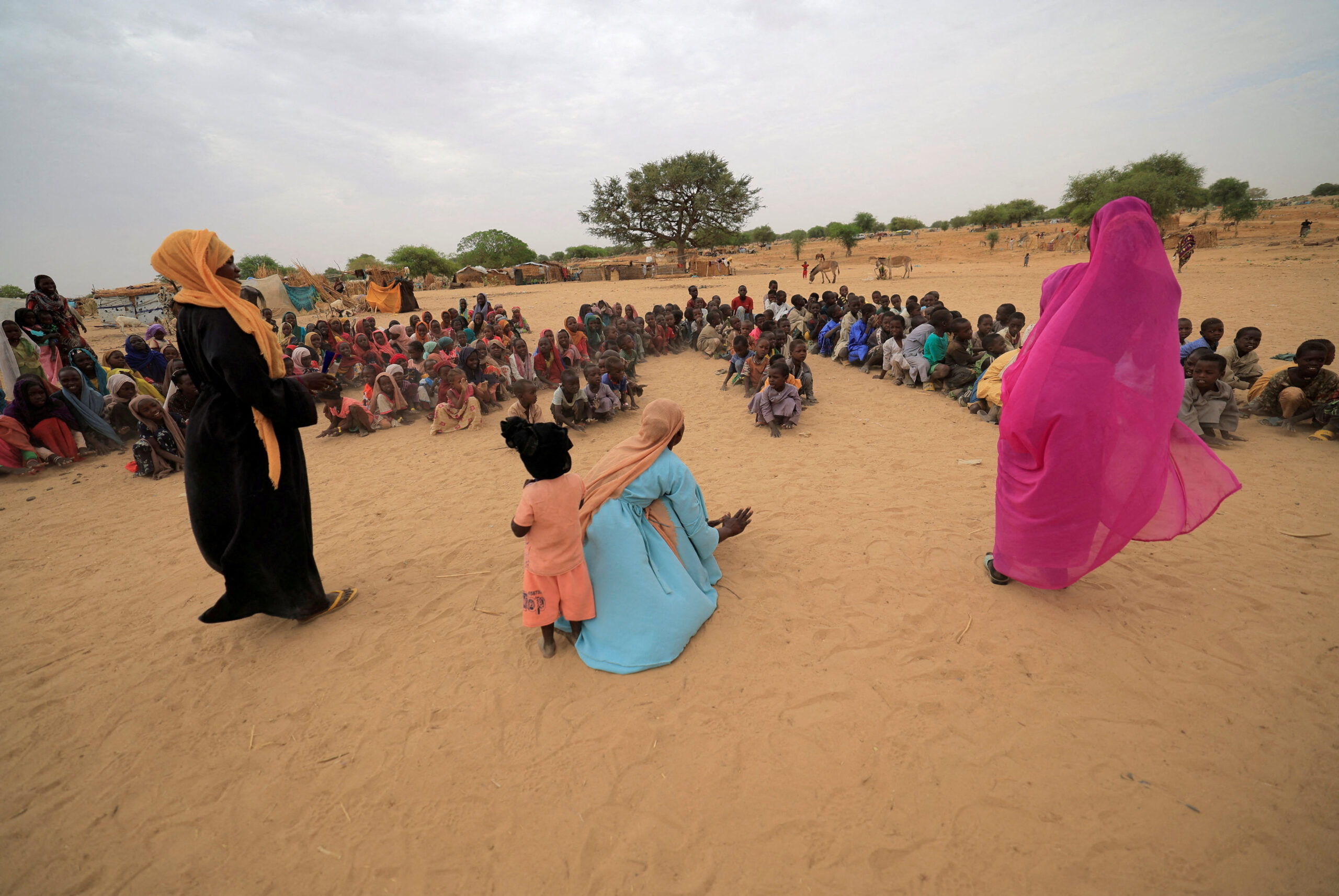Schools shut, exams cancelled: War shatters Sudan’s education sector
 FILE PHOTO: Zahra Haroun, 19, Nawal Adama, 32, Zahra Mohamed, 20, Sudanese refugee teachers who have fled the violence in Sudan's Darfur region, give their first entertainment and sport training session for refugee children at makeshift shelters near the border between Sudan and Chad in Koufroun, Chad May 11, 2023. REUTERS/Zohra Bensemra/File Photo
FILE PHOTO: Zahra Haroun, 19, Nawal Adama, 32, Zahra Mohamed, 20, Sudanese refugee teachers who have fled the violence in Sudan's Darfur region, give their first entertainment and sport training session for refugee children at makeshift shelters near the border between Sudan and Chad in Koufroun, Chad May 11, 2023. REUTERS/Zohra Bensemra/File PhotoWhen war in Sudan’s capital forced Sarah al-Sharif and her family to flee, the 19-year-old information technology student left her books and computer behind.
Now in Sennar, 30km (18 miles) southeast of Khartoum, she lacks a stable internet connection or passport to travel abroad and like many others sees no way of continuing her studies while fighting between rival military factions rages.
The conflict, which began in mid-April, has pushed Sudan’s faltering education system into a state of collapse, with many schools shut down or repurposed to host displaced people, and most national end-of-year exams cancelled.
“This war has spelled the end of education in Sudan, and things have turned from bad to impossible,” said Sharif.
The conflict has brought daily battles to the streets of Khartoum, a revival of ethnically-targeted attacks in Darfur, and the displacement of more than 4 million people within Sudan and across its borders.
According to Simone Vis of UNICEF in Sudan, there are “an alarming number of reports that both boys and girls are being recruited by armed groups”.
At least 89 schools across seven states are being used as shelters for the displaced, according the United Nations, raising fears that many children will have no access to schools in the new academic year and could be exposed to child labour and abuse.
On Wednesday, the education minister cancelled most end of year school exams in war-affected areas.
“In the current circumstances, anyone would see that it is impossible to have a new academic year,” said Sahar Abdullah, a displaced teacher from Khartoum also seeking refuge in Sennar.
TEACHERS STRIKE
Even before the war between Sudan’s army and the paramilitary Rapid Support Forces (RSF), Save The Children ranked Sudan as one of the top four countries globally where education was at extreme risk.
Now the number of children out of school has risen to 9 million from 6.9 million, more than one million school-aged children have been displaced and at least 10,400 schools have been closed since fighting started, according to the charity.
While Khartoum has a proud intellectual tradition, the schooling system had been run down by underinvestment, political interference and a grinding economic crisis. It was then disrupted by street protests before and after the 2019 ousting of former leader Omar al-Bashir, by unusually heavy floods in 2020 and by the coronavirus pandemic.
Due to overcrowded school classrooms, “some of the students would bring chairs with them to class. There weren’t enough textbooks to help teachers do their job,” said Abdullah, the displaced teacher.
State-employed teachers staged a three-month strike over pay and working conditions just before the war broke out. As many as 300,000 teachers have not been paid since March, a senior member of the Sudanese Teachers’ Committee said.
“I haven’t been paid a salary in four months, and I have no idea when I’ll return to work,” said Fatima Mohamed, a displaced teacher who fled Khartoum to Gedaraf state after her school was overtaken by the RSF.
‘WAIT AND HOPE’
Despite the interruptions in recent years, Rabab Nasreldeen had managed to get to the third year of law studies at the University of Khartoum when the war broke out.
Then she too had to flee, abandoning educational certificates and papers that might allow her to continue studying elsewhere. “The only option we have is to wait and hope for the best,” she said.
Aid workers are trying to help alleviate the crisis, setting up safe learning spaces and providing children with psychosocial support.
Education Cannot Wait, the U.N. global fund dedicated to education in emergencies, has raised $12.5 million and aims to provide educational services for 120,000 children in Sudan and neighbouring countries.
During the COVID-19 pandemic, parents in wealthy countries “didn’t want the children to wait a year or a month for their education,” said Yasmine Sherif, the fund’s executive director.
“So why should we expect them (in Sudan) to wait for education until the conflict is over?”
Some of those who have fled Sudan are seeking entry to schools and universities outside its borders, including in Egypt. But in Chad, where more than 377,000 refugees have arrived, there are no such options.
“I cannot go back to continue my education and I lost contact with my family,” Khalifa Adam, a displaced student who escaped to Adre, Chad from Darfur, told Reuters. “I was told I can continue studying online but the internet connection here in Adre is very bad.”
Source: Reuters










